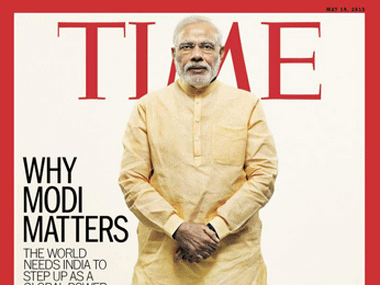Prime Minister Narendra Modi is going to complete a year in office come 26 May, 2015. And in this one year, he has received much adulation in India and abroad for a majority of Indians who have voted him to power. While his critics have termed his popularity the result of an expensive PR campaign, PM Modi has managed to create a positive image about the India across the world. Or so is being reported in the media. No surprises then that Modi made it to the Time Magazine’s 100 most influential people in the world, with a glorifying write-up by none other than US President Barack Obama. [caption id=“attachment_2232944” align=“alignleft” width=“380”]  Prime Minister Narendra Modi in a screengrab from Time Magazine.[/caption] Since his coming to power, Modi has visited several countries to promote brand India, something that has been relentlessly criticised by the Opposition. They claim that while the country reels under several pressing problems, the PM is never in the country managing its affairs. And just a few days ahead of another foreign trip, to China, PM Modi in an exclusive interview Time Magazine speaks about an array of issues — from religion, terrorism to freedom of speech and relationships with other countries. Here are th e key take aways from the interview: Modi on China The relationship between India and China hasn’t been far from being ideal in the recent times. Encroachment in Arunachal Pradesh by the Chinese Army has been a cause of concern, as has been the incursion in Ladakh last year. While Modi, during the run up to the polls, had lambasted the UPA, calling them ‘cowards’, his own government has done not much more in the issue, except for the issuing occasional warnings via the Home Ministry. When asked about the tense relationship between the two countries PM Modi tells Time magazine, “For nearly three decades there has been, by and large, peace and tranquility on the India-China border. Not a single bullet has been fired for over a quarter-century. Both countries are showing great maturity and a commitment to economic cooperation.” Dictatorship or democracy? The Opposition has called Narendra Modi a dictator a countless number of times. He has been accused of being an autocrat who likes to micromanage everything. But when asked about the kind of authoritarian power that Chinese leaders enjoy, PM Modi championed the values of democracy. He told Time Magazine, " So if you were to ask me whether you need a dictatorship to run India, No, you do not. Whether you need a powerful person who believes in concentrating power, No, you do not. If you were to ask me to choose between democratic values and wealth, power, prosperity and fame, I will very easily and without any doubt choose democratic values." Spouting hostile Hindutva ideas, by sadhvis and babas Divisive comments by BJP MPs like Sadhvi Prachi and Sakshi Maharaj, the ‘ghar wapasi’ campaign, love jihad and attacks on those belonging to minority communities by right-wing goons have been a menace that PM Modi has, as yet, failed to control. And as the Time Magazine asked him about this issue, he repeats what he has said several times already: “My philosophy, the philosophy of my party and the philosophy of my government is Sabka saath, sabka vikas—“Together with all, progress for all.”… All religions and all communities have the same rights, and it is my responsibility to ensure their complete and total protection. My government will not tolerate or accept any discrimination based on caste, creed and religion.” The controversy surrounding the ban on India’s Daughter The ban on Leslie Udwin’s documentary India’s Daughter caused much outrage across the nation, with activists saying the government was trying to stifle voices. When asked about the issue of freedom of speech PM Modi was of the opinion that India was committed to freedom of speech and as far as the documentary was concerned, the matter was sub judice and the victim’s identity was compromised. “In so far as freedom of speech is concerned, as I mentioned earlier, there is absolutely no issue,” the Prime Minister told Time Magazine. Terrorism PM Modi has spoken about terrorism in every country that he has visited so far. He has repeatedly urged the world to “unite against this threat to humanity.” In his interview the Prime Minister reiterated his stand, calling for the passing of theUnited Nations Comprehensive Convention on International Terrorism. Like earlier, he also called for the isolation countries “that stand in support of terrorism”. Relations with the US and his ‘friend’ Obama The camaraderie between Barack Obama and Narendra Modi has been visible each time they are seen together. While Modi’s ‘friend’ Obama joined him in a Mann ki Baat programme on radio during his India visit, the US president in his write up in Time about Modi called him ‘India’s reformer-in-chief’. While both the leaders believed that good ties between India and US will have positive implications world wide, PM Modi reiterates that in his interview: “We are natural allies … [It’s not] what India can do for the U.S., what the U.S. can do for India … The way we should look at it is what India and the U.S. can together do for the world … strengthening democratic values all over.” Read Modi’s full intervew here.
Just a few days ahead of another foreign trip, to China, PM Modi in an exclusive interview Time Magazine speaks about an array of issues — from religion, terrorism to freedom of speech and relationships with other countries.
Advertisement
End of Article


)
)
)
)
)
)
)
)
)



